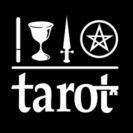The powers of Fortune, are very simple. An improvement of luck for the better – luck is either delayed or diminished when reversed. For most readings, this interpretation works very well, but there are hidden depths to this card that need to come to the surface.
The Hebrew letter Kaph, means ‘the palm of the hand’ reinforces the perception that palmistry, fate and destiny are also related.
Aleister Crowley in his Thoth Tarot takes a more cosmological route:
This card represents the Universe in its aspect of a continual state of change. Above the firmament of stars.
He could well be talking about the Major Arcana rather than the universe we live in. The Universe represents Saturn, which is dull and heavy. There is also another reference to ‘the stars’, un-capitalised, which could easily be The Star, Hope. We thus have a Trinity at work of better Fortune, the heaviness of the Universe and the aspirational Star.
Fortune and the Three Gunas
Crowley tells us that the figures of the Sworded Sphinx, Hermanubis, and Typhon are the Trinity, but before we explore them, to go to deeper, hidden level, that of the three Gunas – Satva, Rajas and Tamas. We can tabulate this information for clarity:
| Guna | Quality | |
|---|---|---|
| Fortune | Rajas | Energy, excitement, fire, brilliance, restlessness |
| Star | Sattva | Calm, intelligence, lucidity and balance |
| Universe | Tamas | Darkness, inertia, sloth, ignorance, death |
The word ‘Guna’ is untranslatable. As Crowley says,
It is not quite an element, a quality, a form of energy, a phase, or a potential; all of these ideas enter into it.
Central to the philosophy is that “the Gunas revolve”, so Crowley is giving Fortune a dual role. On the one hand, it is Rajas, the Guna of change, while on the other, it is all three Gunas. This dualistic approach gives us a powerful system for use in magic.
